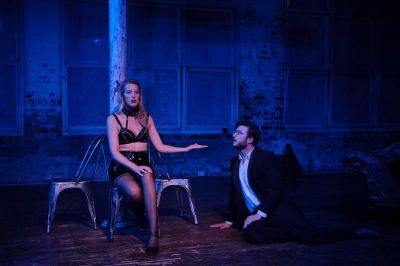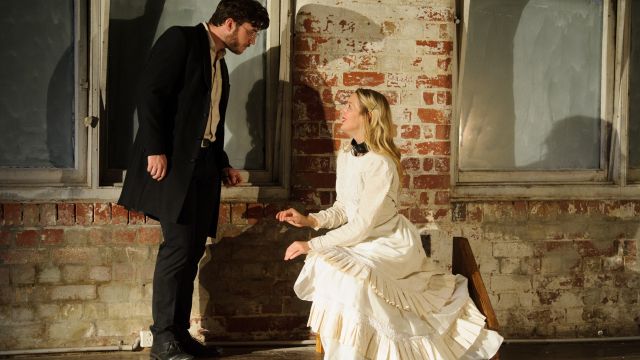Venus in Fur
As the old Johnny Mercer song has it, ‘when an irresistible force such as you, meets an old immovable object like me… something’s gotta give…’ That’s not I hope to trivialise David Ives’ play, which, despite its comedy, its wordplay, its surprise reveals and reversals, and its twist on the romantic comedy form, deals with a big theme – but in a most entertaining way and – by happenstance – most timely way. The story premise is simple: the play depicts a theatrical audition – and therefore there’s a play within the play - in which the balance of power shifts, and shifts again, and gender roles are overturned and undermined – or possibly corrected…
The ‘immovable object’ (or so he thinks) is Thomas (Darcy Kent) a playwright who has adapted the 19th century novel by Leopold Sacher-Masoch, Venus in Furs. His hero is searching for the right woman so as to become her slave – and all the ‘masochistic’ traits that go with that. Thomas is casting the play, which he will also direct. It’s a stormy evening in New York (the location is quite unimportant), and Thomas rants by phone to an associate that he has auditioned thirty-five actresses for the role of ‘Vanda’ that day, all of them talentless or airheads, and all looking either like hookers or dykes. Thomas, we quickly infer, is intellectual, opinionated but amusing and very secure in his ideas and identity. All that is about to be overturned – although we may already be on the edge of a suspicion that what he seeks may not exist.
Now he’s tired, he’s about to pack it in. He phones his fiancée (an unseen but most important character) to say he’ll be home soon. But then Vanda (Tilly Legge) crashes in. She claims that her name being the same as the play’s heroine is coincidental. She’s also loud, foul-mouthed, garrulous and initially angrily flustered. She’s late, she knows that, but insists that her agent definitely set up an audition. She seems shallow, ill-educated, even stupid… For Thomas, she is clearly, totally, out-of-the-question unsuitable.
 But she is the ‘irresistible force’. There is something almost supernatural about her. As things go on, we may wonder why, really, she is there. Has she been sent? But now, she just forges ahead, cajoles, wheedles and insists and somehow, he finds himself auditioning her. Once she slips into the role, she transforms, she becomes, to his bewildered amazement, his ‘Vanda’: a refined, softly spoken upper-class woman of 1870… She’s even brought the correct, if shabby, period dress. What’s more, she knows his play – all of it – even if her take on it – ‘it’s porn, isn’t it?’ – is not so high flown as his.
But she is the ‘irresistible force’. There is something almost supernatural about her. As things go on, we may wonder why, really, she is there. Has she been sent? But now, she just forges ahead, cajoles, wheedles and insists and somehow, he finds himself auditioning her. Once she slips into the role, she transforms, she becomes, to his bewildered amazement, his ‘Vanda’: a refined, softly spoken upper-class woman of 1870… She’s even brought the correct, if shabby, period dress. What’s more, she knows his play – all of it – even if her take on it – ‘it’s porn, isn’t it?’ – is not so high flown as his.
It’s a great set-up and it has that essential quality of making us want to know ‘what happens next?’ The audience leans forward and pays close attention. There are, however, some curious production decisions that distract us. Megz Evans’ lighting changes often seem arbitrary, and at times confusing, given that sometimes Vanda herself flips switches on stage and at other times the lights change all by themselves. I hope the music and sound design – by Claire Healy and Linton Wild respectively, both experienced – can be sorted out during the run. On opening night, both music and effects intruded rather than enhanced; they sounded tinny and thin, as if somebody’s mobile had gone off, puzzling the audience.
Also on opening night, Darcy Kent and Tilly Legge may have been keyed up and nervous: both were at first, a little too loud and over-emphatic. While Mr Kent’s Thomas is clear and authoritative at first, as he should be, there is never quite the developing sense of his becoming in thrall to Vanda, overwhelmed by her and truly helpless in her power. Yes, that’s what we see, but we don’t feel it.
Part of that power is sexual; Vanda makes Thomas desire her – makes him malleable, sweaty palmed, weakened. The problem here is the absence of that - an element essential to the piece: sensuality – or, to be blunt, sex. It’s the usual Australian reticence and pussy-footing – a surprising misstep from such a fine director as Kirsten van Bibra. Although Ms Legge parades around in black underwear and suspender belt, there’s not much heat. There’s little of the seductress and more of the clever manipulator who bamboozles her victim. It’s an accomplished, animated but rather technical performance. We admire at and laugh with her clever switches from actress Vanda to character ‘Vanda’, but she is not, as it were, irresistible – at least to Thomas – and it’s important that she be.
This lack is unfortunate since, without that element, which could clearly heighten the tension, the play begins to feel repetitious. But as the ‘reading’ of Thomas’s Sacher-Masoch adaptation text builds and takes over, becoming the play, Thomas’s delusions about himself, and men, and women, and his resentment of that unseen fiancée are revealed. It is as if Vanda knows him through and through and now will make him see himself as he really is. At the same time, she is the power of the Female – Venus, Aphrodite, a force of Nature. It’s what Thomas has only pretended to acknowledge, playing with the idea, with the titillation of a man as a woman’s slave. His finally shattered reality is, for all his daring themes, philosophical speculations and assertions, the same old, same old male fantasy of female surrender. Timely.
Michael Brindley
Photographer: Sarah Walker
Subscribe to our E-Newsletter, buy our latest print edition or find a Performing Arts book at Book Nook.

